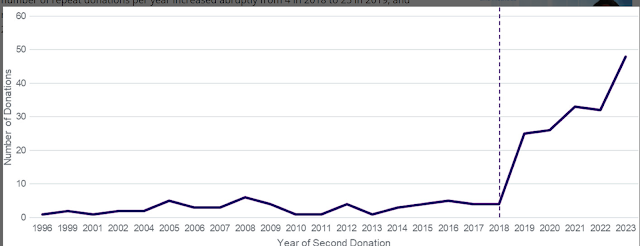Some living donors are moved to do it twice: first a kidney, and then later a liver, or the other way around. It appears that this is trending upwards in the last few years.
Second Time Around: Increased Rate of Living Donation From Repeat Organ Donors by Carolyn N Sidoti 1, Kelly Terlizzi 1, Conor Donnelly 1, Ian S Jaffe 2, Jennifer D Motter 1, Benjamin Philosophe 3, Reed T Jenkins 3, Sarah Hussain 3, Pedro Colon 2, Amit D Tevar 4, Bonnie E Lonze 1, Babak J Orandi 1 5, Macey L Levan 1, Dorry L Segev 1 6, Allan B Massie, Clin Transplant, 2025 Jan; 39(1):
https://onlinelibrary.wiley.com/doi/10.1111/ctr.70049
"Abstract
Introduction: Some living organ donors will decide to donate again at a later date. Evidence has indicated that this practice may have increased in recent years. We evaluated the incidence and outcomes of this practice to inform counseling of potential repeat donors.
Methods: Using SRTR data from 1994 to 2023, we identified 220 repeat living donors and their 415 recipients. We constructed donor comparison groups using weighting by the odds. We described clinical and lab results at 6 months, 1 year, and 2 years post-donation separately for kidney-second donors and liver-second donors. We compared all-cause graft failure for their recipients with those of comparison donors.
Results: The annual count of repeat living donors increased from 5 in 2018 to 25 in 2019 (p < 0.001). Of 220 donors, 159 were liver-second donors (72.3%) and 55 were kidney-second donors (25.0). The percentage of nondirected donations increased from 30.5% at first donation to 53.2% at second donation (p < 0.001). Liver-second donors had one death approximately 2.5 years post-donation. Seventeen were re-admitted and 20 experienced complications requiring an interventional procedure or re-operation. Among kidney-second donors, no deaths, re-admissions, or post-donation complications were reported. Post-donation outcomes in both groups were comparable when evaluated against organ-specific comparison donors. Recipients of repeat living donors experienced graft survival similar to recipients of comparison donors.
Conclusions: Repeat living donation may be a safe practice for carefully selected living donors in the short term; however, long term safety is unknown. Outcomes for recipients are similar to recipients of comparison donors."
...
"The first reported instance of repeat living donation occurred in 1981 when a living kidney donor went on to donate a segment of their pancreas 2.3 years later [1].




No comments:
Post a Comment